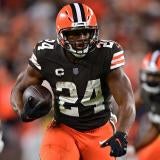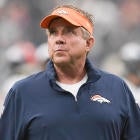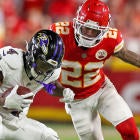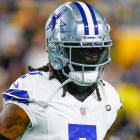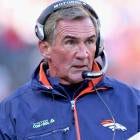
The Denver Broncos are in flux. And that's putting it lightly. Days after announcing plans to release Russell Wilson, the once-heralded quarterback who cost them a fortune for two tumultuous seasons, the team has also cut ties with longtime leader Justin Simmons, sacrificing one of the roster's most accomplished veterans in the name of direly sought salary-cap space.
This turnover was always anticipated. It's the kind of uneasy shakeup endured by any team with bloated investments and eight straight non-playoff seasons. But in the case of the 2024 Broncos, it's clearer than ever that the keys to any potential turnaround rest with one man and one man alone: Sean Payton.
To be clear, the Broncos' deep-seated issues took root well before Payton's arrival. Not long after Peyton Manning's Super Bowl sendoff, the John Elway-led front office repeatedly tried -- and failed -- to revive the quick fix at the game's most important position. Aging or battered quarterbacks like Case Keenum, Joe Flacco and Teddy Bridgewater all secured pricey deals from Denver between 2018-2021, and none of them lasted more than a single season as the signal-caller.
Higher up, team leadership has been even more unsteady. Elway remained in the building after hiring his own general-manager replacement, George Paton, in 2021. Sean Payton's predecessor, Nathaniel Hackett, was hired days before the entire franchise went up for sale. The Hackett regime mortgaged the future in the trade for Wilson just months before the current Walton-Penner ownership group put pen to paper. Headlines touted the big names fueling these transfers of power -- hey, look, Condoleezza Rice! -- but did nothing to halt the directionless march of an ailing football team.
Which brings us to now. Payton entered with a vision. An unwavering one, it seems. He wasted little time publicly asserting his power over any and everyone who came before and helped stain the Broncos' recent reputation, be it those already ousted (Hackett) or those destined to follow suit (Wilson). One season in, you can't say he isn't getting closer to building a program his way. The highly paid quarterback is gone. So, too, are other familiar faces, like Simmons, because the bills have come due. Even his staff is starting to resemble his old New Orleans Saints squad, with several ex-colleagues coming aboard this offseason.
The ultimate question, however, is what Payton intends to do next. This may be the first time in a long time that Broncos ownership is genuinely aligned with its chief decision-maker, or at least fully invested in his plans. How else, for example, do you justify eating a historic amount of money just so that Wilson, such a prized acquisition just two years ago, doesn't take another snap in orange and blue? It's clear Payton's got the backing to do what he wishes. To tear this whole thing down and start fresh as best he can. But he'd better be right. He's been given permission to save Denver his way; now how will he actually try do it?
As is often the case in today's NFL, it'll probably come down to what happens under center. Payton's former team, the Saints, are an annual example of a team refusing to rebuild, constantly reworking contracts and manipulating the cap to prolong playoff relevance. But the Payton-era Saints often got away with that because they had a quarterback in Drew Brees to help offset the cap constraints. Can Payton and the Broncos manipulate their own cap long enough to get things right at that position?
Internally, it wouldn't be surprising if the pipe dream is signing Kirk Cousins, the Minnesota Vikings starter on track to test the market. He's aging and coming off injury, but he's precisely the kind of excel-within-the-system point guard that Payton probably covets. Money talks in free agency, though, and Payton's teardown suggests Cousins will have richer offers elsewhere. Perhaps the Broncos might pivot to a discount version of Cousins -- a Ryan Tannehill, perhaps -- or continue the trend of Saints reunions with a low-cost insurance option like Jameis Winston.
But the real intrigue lies in the draft, where Denver picks No. 12 overall and could have a shot to draft one of the top quarterback prospects, be it Michigan's J.J. McCarthy, Washington's Michael Penix Jr. or Oregon's Bo Nix. Any of them would be a gamble, particularly because Payton has yet to identify and develop a homegrown franchise quarterback in his illustrious career. But they'd at least represent hope for the future, and not just a delusional take on the present -- which Denver has adopted for too long.
No matter what, Payton's direction is critical here. The last time an NFL team went so abruptly in, then out, on a quarterback was probably the Indianapolis Colts with Carson Wentz in 2021. In that situation, also rife with upper-management input, the coach wasn't for long. Here, with the Broncos, Payton surely holds more sway than Frank Reich ever did. But that just means these next steps will be credited to him, for better or worse. It's time for real change in Denver. What kind of change will he bring?








